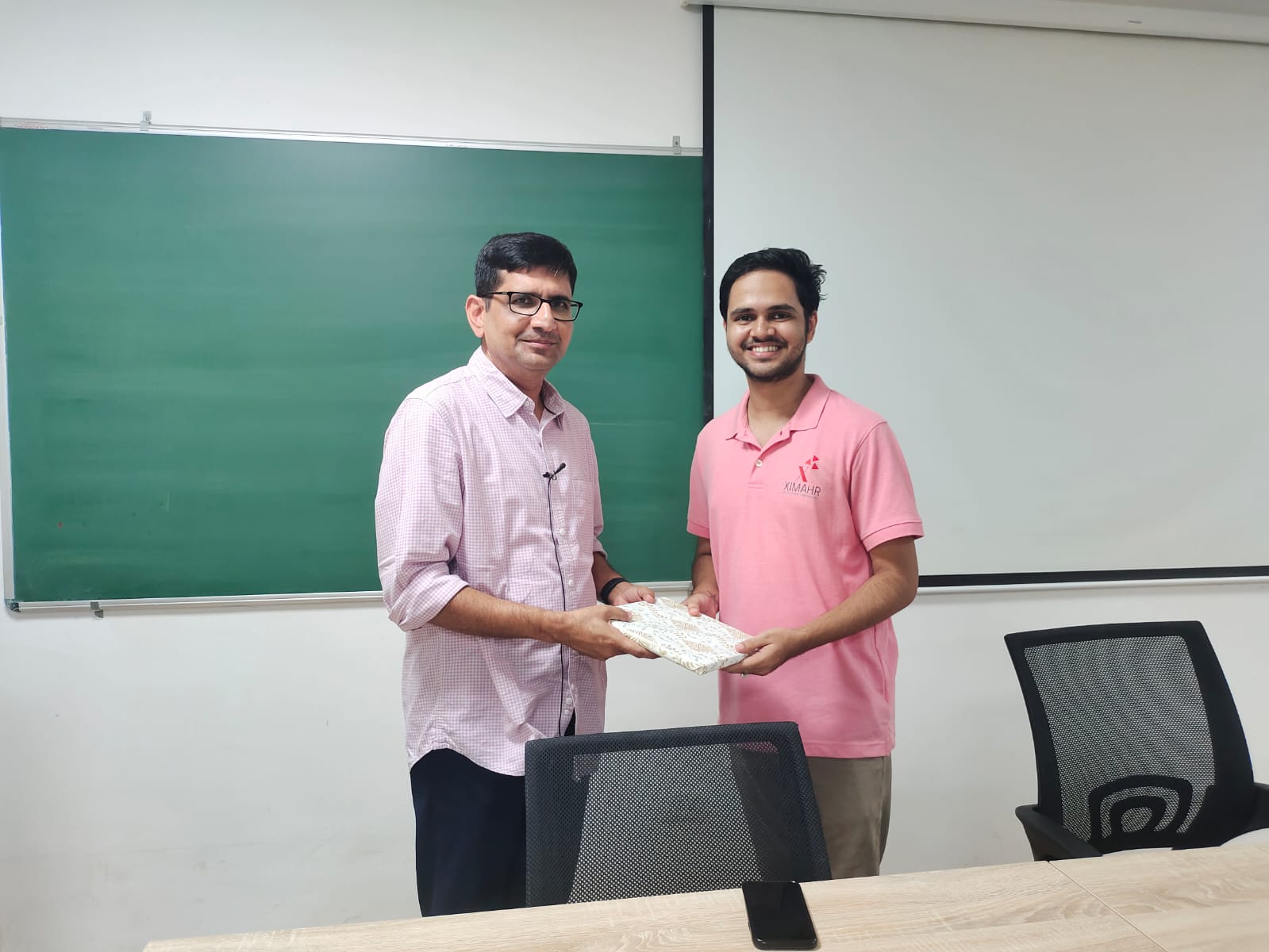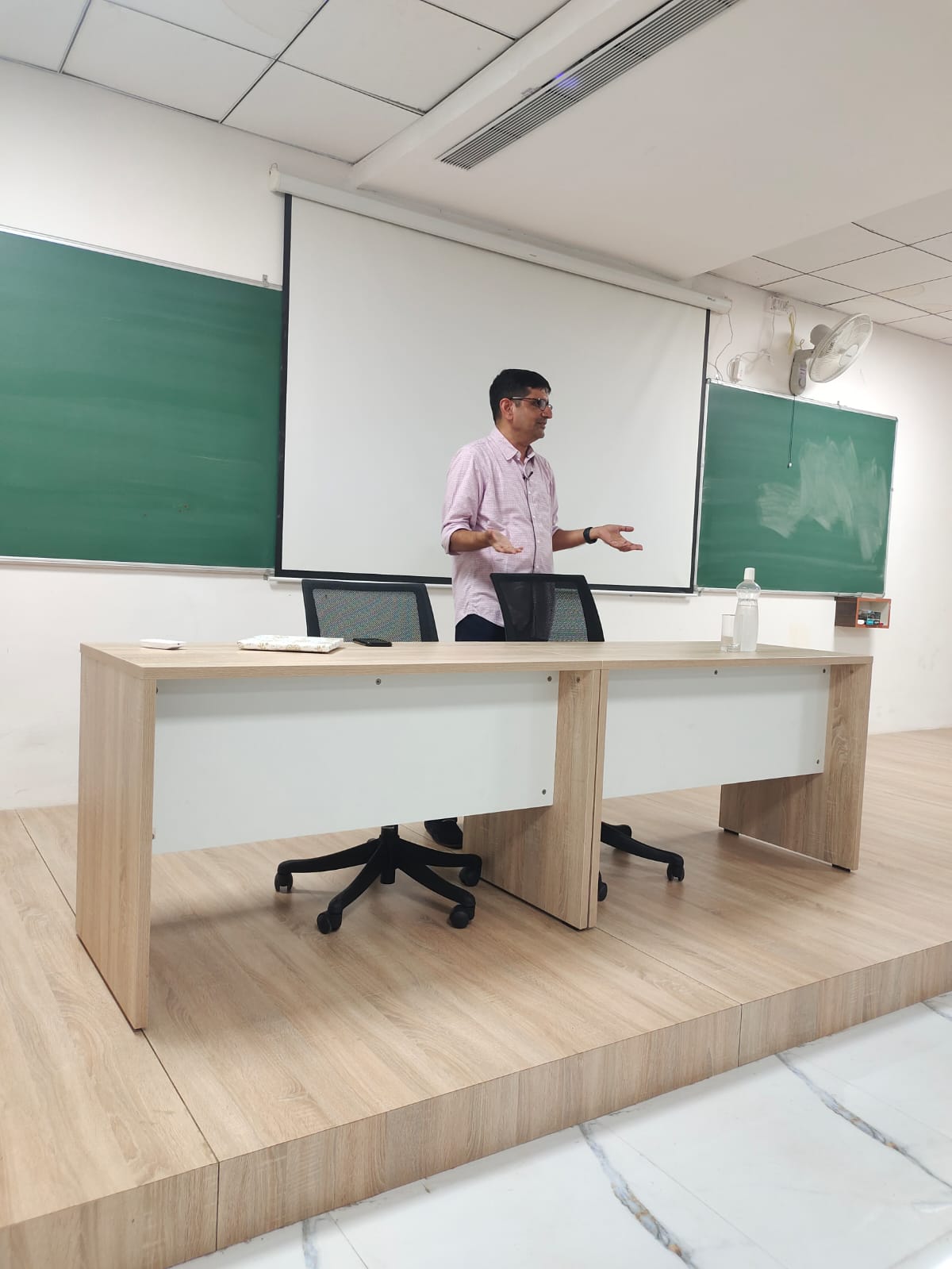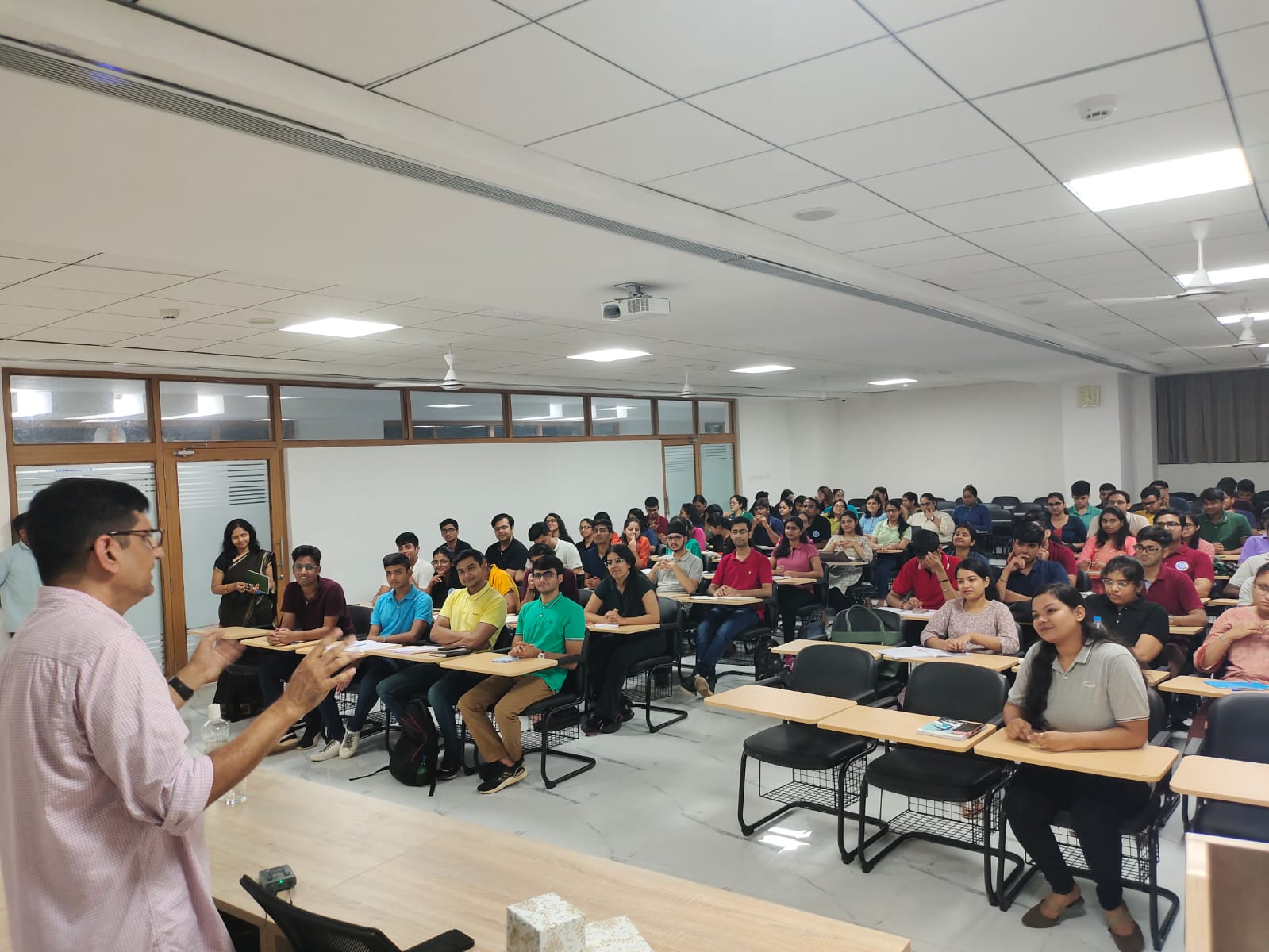Speaker: Mr. Magesh Sambasivan
Date: 2nd September, 2023
Theme: Leveraging HR Tech for Hyper-Personalization in Organisations
The first-year students of the School of Human Resource Management, XIM University, were fortunate enough to attend a Leadership Talk on the theme – Leveraging HR Tech for Hyper-Personalization in Organisations on the 2nd of September, 2023, which was very immaculately delivered by Mr. Magesh Sambasivan, VP – APAC People Organization at Assurant Ltd., who is also a member of the Strategic Academic Advisory Board and an alumnus of XIMB. While the theme was highly relevant to the first-year students, the speaker made it a point to deliver his thoughts using real-time examples from his professional experience and personal experience as an expatriate, which made the session even more exciting and valuable.

The first-year students of the School of Human Resource Management, XIM University, were fortunate enough to attend a Leadership Talk on the theme – Leveraging HR Tech for Hyper-Personalization in Organisations on the 2nd of September, 2023, which was very immaculately delivered by Mr. Magesh Sambasivan, VP – APAC People Organization at Assurant Ltd., who is also a member of the Strategic Academic Advisory Board and an alumnus of XIMB. While the theme was highly relevant to the first-year students, the speaker made it a point to deliver his thoughts using real-time examples from his professional experience and personal experience as an expatriate, which made the session even more exciting and valuable.
Talk Summary
The session, helmed by Mr. Magesh Sambasivan, VP – APAC People Organisation at Assurant, commenced with a spirited dialogue on the crux of HR Technology and how it may be leveraged within the corporate world. It was further thoughtfully aligned with the context of hyper-personalization within organizations. The leader further discussed his interest in the field, aligning with his educational background. (Computer Science Degree from BITS Pilani and an MBA-HR from XIM University 1998 batch). The participants engaged in a profound exploration of the applications and leveraging of AI-related HR technology (which is also the need of the hour) clearly showing its traits and responsibilities. The talk given by Sir illuminated the quintessential attributes of HR Technology, such as data analytics, automation, recruitment applicant tracking, etc. These facets were underscored as the bedrock upon which the application of HR technology with the help of AI is both efficient and effective.
Mr. Magesh Sambasivan wove his journey into the narrative, offering live examples of situations while answering the queries of the eager participants. He emphasized the importance of automation and data accuracy, which must be acquired only by ethical means. He also presented the organization’s point of view in sync with the mission and vision of the organization, illustrating the synergy required for successful data analysis.
Furthermore, the conversation ventured into challenges that the leader had encountered, such as annual award functions. The talk elegantly conveyed that facing adversity and embracing discomfort is pivotal to cultivating an understanding of HR Technology’s work. He also discussed how employee engagement surveys can be personalized for any particular employee with changes in different factors such as time, manager, scenarios/situations, etc. Apart from this, he also brought to light the astounding ability of HR-related AI tools like chatbots, which can easily monitor employee engagements at different points of time, say on joining the job going up to 6 months on the job, furthering on to a year or several years on the job. He explained well how employing these AI tools becomes a significant precursor to hyper-personalization within organizations.
The fact that AI is not perfect was reiterated by Sir repeatedly, wherein he categorically highlighted that AI may be able to process data, which is enormous. Still, it is severely flawed as it cannot measure a person’s engagement level within the organization regarding his emotional quotient. He mentioned that AI is just an enabler and assister. Sir highly endorsed the study of Behavioral Economics during the talk, which beautifully encapsulated the role it played in understanding how employee engagement works within organizations and how a balance may be struck between control and ethics (especially during data collection).
Overall, the leadership talks on leveraging HR tech for hyper-personalization guided us students in understanding the importance of technology-driven personalization, ethical considerations, leadership support, and the need for continuous improvement. It provoked us to think that organizations must adopt a user-centric approach to HR tech and leverage data and technology to create a more engaging and customized employee experience.
Key Takeaways:
- The importance of the Employee-Centric Approach was well highlighted to understand that employees are at the heart of every organization, and personalizing their experiences is key to engagement and productivity.
- HR technology is more of a strategic enabler and is is imperative to recognize HR technology as a strategic tool for achieving organizational goals and enhancing the overall employee experience.
- The significance of personalized learning and development plans was highlighted that caters to individual employee growth and career aspirations.
- Benefits of hyper-personalization were also showcased and how it can lead to improved employee satisfaction, retention, and performance, ultimately benefiting the organization.
- The importance of leadership was also iterated upon during the talk in terms of buy-in and active support for HR tech initiatives wherein leaders must champion the cause and allocate resources accordingly.
- Ethical Considerations were also stressed upon by Sir wherein ethical implications of collecting and using employee data were discussed along with how data privacy and transparency may be ensured in all HR tech processes.
- Cross Functional collaboration may be encouraged between HR professionals, IT experts, and other relevant departments to effectively leverage HR technology in order to promote hyper personalization within organisations.
Recognized that implementing HR related technological changes will impact the way HR processes work or in simpler words, effective change management strategies are essential to facilitate a smooth transition for employees.
Personalization across the employee lifecycle is equally important as they highlight that personalization efforts should extend across the entire employee lifecycle, from recruitment and onboarding to career development and offboarding.
Sir also emphasized the need for flexibility and agility in HR tech solutions to adapt to changing workforce dynamics and market conditions.
He also stressed upon how to engage employees in the personalization process by soliciting their feedback and involving them in shaping HR tech solutions to ensure that employees’ expectations are duly met.

Q&A Session:
- You mentioned that we need data for hyper-personalizing benefits. What data points are required and what were the ethical implications of collecting this data?
Ans. Certain data points that are required for hyper-personalizing benefits include demographic information (inclusive of age, gender, marital status,, family size etc) , health and wellness data (inclusive of pre-existing conditions and wellness habits), financial data (including salary, debt, savings, goals, benefit offerings like retirement plans etc), career aspirations, work preferences, performance data, feedback and surveys.
A few ethical implications that are there while collecting this data could be Privacy concerns, data security (inclusive of robust security measures for protection of sensitive information), data accuracy (for accurate and precise results), fairness and bias, data minimization, data retention and deletion, consent and opt-out (where employees are given an option to opt-out of the survey process and data governance. - According to you, what are the skills or competencies required by an individual (who is not from a tech background) in order to leverage HR technology?
Ans. Mr. Magesh considers 2 skills that are of utmost importance and are required by an individual (irrespective of his background) in order to leverage HR technology. The 2 aforementioned skills are as follows 1) Design Thinking and 2) Story telling.
Design Thinking: This is a very important skill for an individual to cultivate within himself/herself who is in the HR field for reasons like user centric approach (wherein it places a strong emphasis on understanding and empathizing with the end users, in this case employees), improvement in problem solving skills, inducing innovation and creativity, being a iterative process, promoting cross functional collaboration, improvement in change management and easy adaptation to evolving needs.
Story Telling: This is another skill that is imperative for an individual to have in order to leverage HR technology to promote hyper-personalization in organisations for reasons such as effective communication of mission and vision of the organization, effective engagement of employees, building and fostering of empathy within employees, overcoming resistance, demonstrating values and ethics of the organisation, excellent creation of a shared narrative, enhancing training and development programs, celebrating successes, simplifying complexity and alignment with the organisation’s work culture.
About the Speaker:
Mr. Magesh Sambasivan is the VP – APAC People Organisation at Assurant. In his career spanning 25 years, he has worked in the US, Singapore, and Philippines in various HR roles in areas of leadership development, change management, mergers and acquisitions, compensation & benefits, and talent management in organisations like Aditi Technologies, HP, ANZ Bank, Accenture and Societe Generale. He comes with practical experience in the topics he is speaking about today as he has been a regional compensation head during his tenure at Societe Generale and has led teams of employees from different cultures and regions worldwide and helped build and manage organisations across various countries. Magesh has a background in Computer Science from BITS, Pilani to complement his MBA in HR and systems from XIM University (Batch of 1996-98) and is a strong advocate for using technology to put the focus back on the “Human” in HR. He also is currently on the advisory boards of couple of HR Tech start-ups.


